八年级英语讲义10
人教版八年级英语(下册)Unit 10词汇、句型精讲
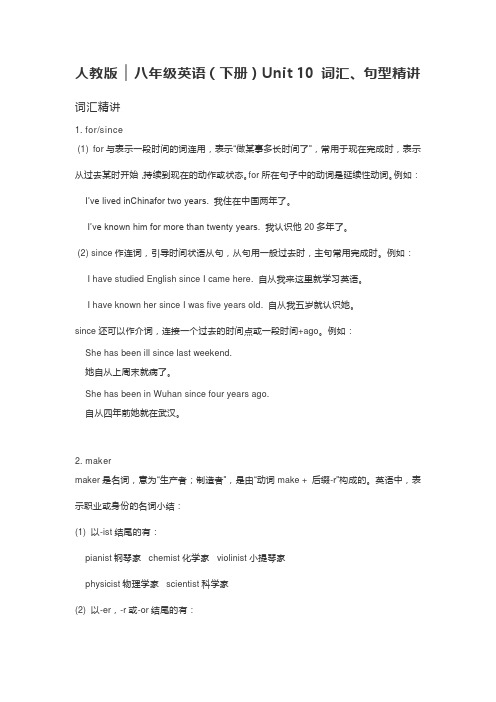
人教版▏八年级英语(下册)Unit 10 词汇、句型精讲词汇精讲1. for/since(1) for与表示一段时间的词连用,表示“做某事多长时间了”,常用于现在完成时,表示从过去某时开始,持续到现在的动作或状态。
for所在句子中的动词是延续性动词。
例如:I’ve lived inChinafor two years. 我住在中国两年了。
I’ve known him for more than twenty years. 我认识他20多年了。
(2) since作连词,引导时间状语从句,从句用一般过去时,主句常用完成时。
例如:I have studied English since I came here. 自从我来这里就学习英语。
I have known her since I was five years old. 自从我五岁就认识她。
since还可以作介词,连接一个过去的时间点或一段时间+ago。
例如:She has been ill since last weekend.她自从上周末就病了。
She has been in Wuhan since four years ago.自从四年前她就在武汉。
2. makermaker是名词,意为“生产者;制造者”,是由“动词make + 后缀-r”构成的。
英语中,表示职业或身份的名词小结:(1) 以-ist结尾的有:pianist钢琴家chemist化学家violinist小提琴家physicist物理学家scientist科学家(2) 以-er,-r或-or结尾的有:teacher教师painter画家writer作家singer歌唱家visitor参观者 actor演员engineer工程师inventor发明家professor教授reporter记者(3) 以-man结尾的有:postman邮递员policeman警察businessman商人spaceman宇航员fisherman渔夫dustman清洁工(4) 以-ian结尾的有:musician音乐家politician政治家3. certaincertain作形容词,意为“某种;某事;某人”。
八年级英语unit 10 i’m going to be a basketball player. 人教版(新目标)知识精讲
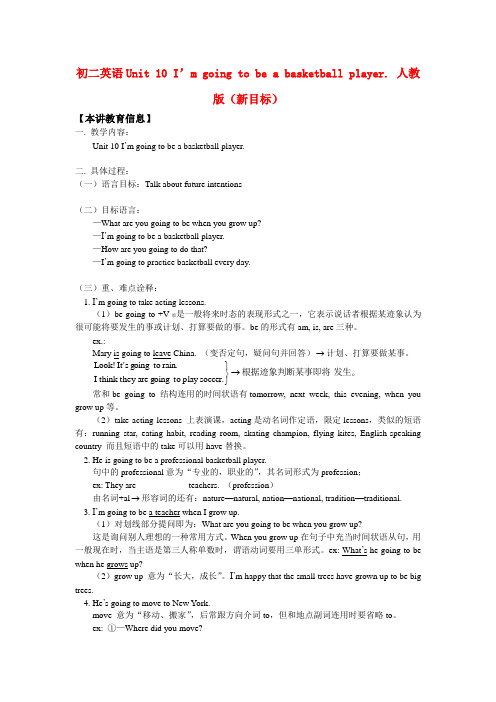
初二英语Unit 10 I ’m going to be a basketball player. 人教版(新目标)【本讲教育信息】一. 教学内容:Unit 10 I ’m going to be a basketball player.二. 具体过程:(一)语言目标:Talk about future intentions(二)目标语言:—What are you going to be when you grow up?—I’m going to be a basketball player.—How are you going to do that?—I ’m going to practice basketball every day.(三)重、难点诠释:1. I’m going to take acting lessons.(1)be going to +V 原是一般将来时态的表现形式之一,它表示说话者根据某迹象认为很可能将要发生的事或计划、打算要做的事。
be 的形式有am, is, are 三种。
ex.: Mary is going to leave China. (变否定句,疑问句并回答)→计划、打算要做某事。
soccer.play to going are y think the I rain. to going s It' Look!发生根据迹象判断某事即将→⎭⎬⎫ 常和be going to 结构连用的时间状语有tomorrow, next week, this evening, when you grow up 等。
(2)take acting lessons 上表演课,acting 是动名词作定语,限定lessons ,类似的短语有:running star, eating habit, reading room, skating champion, flying kites, English-speaking country 而且短语中的take 可以用have 替换。
Unit 10 核心考点讲练 八年级上册英语教学课件(人教版)
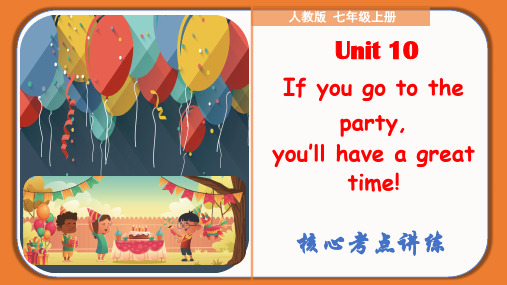
3) 医生建议Alan多运动。 The doctor a_d_v_i_s_e_s/_a_d_v_is_e_d__A_l_a_n___t_o __ta_k_e_/_d_omore exercise.
Language points
1. Can you give me some advice please?
advice相当于汉语“建议;忠告”的意思,是 不可数名词,故不可添加复数词尾-s!表示“一 条建议;一则忠告” 应说a piece of advice或a word of advice。如:
误地). 3) ___M_a_k__e___ ____n_o_____ __m__is_t_a_k_e__(别搞错), Amy is popular
in our school.
himself pron. 他自己 【链接】反身代词
形容词性物主代词+self/selves构成
人称 第一人称 第二人称
第三人称
Joe仍然在生我的气。 Miss Miller was angry at/about my mistakes. Miller小姐因我的错误而生气。
【拓展】 angrily adj. 愤怒地,生气地 anger n. 怒火;怒气 in anger 生气
【语境应用】用正确的介词填空。 1) At first, I felt very angry _a_t/_a_b_o_u_t_ losing my job. 2) Please don’t be angry __w__it_h____ me. It wasn’t my fault
2015年秋新人教版八年级上册英语Unit10课文重难点讲解
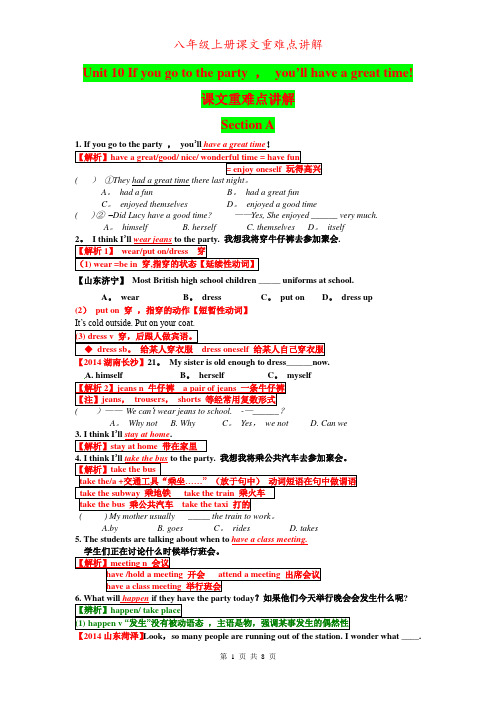
Unit 10 If you go to the party ,you’ll have a great time!课文重难点讲解Section A1. If you go to the party ,you’ll have a great time!【解析】have a great/good/ nice/ wonderful time = have fun= enjoy oneself 玩得高兴( )①They had a great time there last night。
A。
had a fun B。
had a great funC。
enjoyed themselves D。
enjoyed a good time( )②–Did Lucy have a good time? ——Yes, She enjoyed ______ very much.A。
himself B. herself C. themselves D。
itself2。
I think I’ll wear jeans to the party. 我想我将穿牛仔裤去参加聚会.【解析1】wear/put on/dress 穿(1) wear =be in 穿,指穿的状态【延续性动词】【山东济宁】Most British high school children _____ uniforms at school.A。
wear B。
dress C。
put on D。
dress up(2)put on 穿,指穿的动作【短暂性动词】It’s cold outside. Put on your coat.(3) dress v 穿,后跟人做宾语。
◆dress sb。
给某人穿衣服dress oneself 给某人自己穿衣服【2014湖南长沙】21。
My sister is old enough to dress______now.【解析2】jeans n 牛仔裤 a pair of jeans 一条牛仔裤【注】jeans,trousers,shorts 等经常用复数形式A。
专题10.3 Grammar--八年级英语人教版(下册)培优讲义含答案
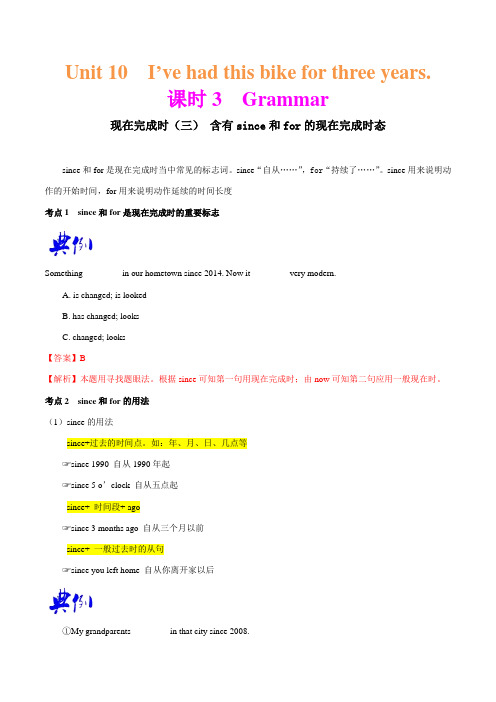
Unit 10 I’ve had this bike for three years.课时3 Grammar现在完成时(三)含有since和for的现在完成时态since和for是现在完成时当中常见的标志词。
since“自从……”,for“持续了……”。
since用来说明动作的开始时间,for用来说明动作延续的时间长度考点1 since和for是现在完成时的重要标志Something ________ in our hometown since 2014. Now it ________ very modern.A. is changed; is lookedB. has changed; looksC. changed; looks【答案】B【解析】本题用寻找题眼法。
根据since可知第一句用现在完成时;由now可知第二句应用一般现在时。
考点2 since和for的用法(1)since的用法since+过去的时间点。
如:年、月、日、几点等☞since 1990 自从1990年起☞since 5 o’clock 自从五点起since+ 时间段+ ago☞since 3 months ago 自从三个月以前since+ 一般过去时的从句☞since you left home 自从你离开家以后①My grandparents ________ in that city since 2008.A. will liveB. liveC. have livedD. were living【答案】C【解析】句意:我的祖父母从2008年就生活在哪个城市里。
since+过去的时间点是现在完成时的标志。
②I'm looking after Tom today. He's been in my house ________ 8:00 this morning.A. atB. sinceC. forD. till【答案】B【解析】句意:我今天一直在家照看汤姆。
八年级上册英语讲义 北师大版
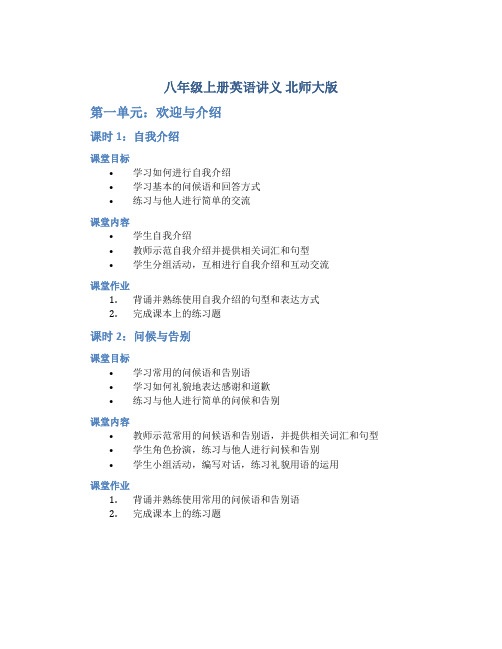
八年级上册英语讲义北师大版第一单元:欢迎与介绍课时1:自我介绍课堂目标•学习如何进行自我介绍•学习基本的问候语和回答方式•练习与他人进行简单的交流课堂内容•学生自我介绍•教师示范自我介绍并提供相关词汇和句型•学生分组活动,互相进行自我介绍和互动交流课堂作业1.背诵并熟练使用自我介绍的句型和表达方式2.完成课本上的练习题课时2:问候与告别课堂目标•学习常用的问候语和告别语•学习如何礼貌地表达感谢和道歉•练习与他人进行简单的问候和告别课堂内容•教师示范常用的问候语和告别语,并提供相关词汇和句型•学生角色扮演,练习与他人进行问候和告别•学生小组活动,编写对话,练习礼貌用语的运用课堂作业1.背诵并熟练使用常用的问候语和告别语2.完成课本上的练习题第二单元:家庭与朋友课时1:家庭成员课堂目标•学习家庭成员的英文表达•学习如何用英语描述家庭关系•练习运用所学内容进行口语表达课堂内容•学生一一介绍自己的家庭成员•教师示范描述家庭成员的表达方式,并提供相关词汇和句型•学生小组活动,练习描述家庭关系,进行口语交流课堂作业1.背诵并熟练使用家庭成员的英文表达2.完成课本上的练习题课时2:朋友课堂目标•学习如何用英语描述朋友的特点和爱好•学习如何用英语表达友谊和感谢•练习与他人进行简单的口语交流课堂内容•学生介绍自己的朋友,并描述他们的特点和爱好•教师示范描述朋友的特点和爱好,并提供相关词汇和句型•学生小组活动,练习描述朋友以及表达友谊和感谢课堂作业1.背诵并熟练使用描述朋友的句型和表达方式2.完成课本上的练习题第三单元:学校生活课时1:校园规则课堂目标•学习学校规则的英文表达•学习如何礼貌地表达请求和建议•练习运用所学内容进行口语表达课堂内容•学生讨论并总结学校的规则•教师示范表达请求和建议的句子,并提供相关词汇和句型•学生小组活动,练习礼貌地表达请求和建议课堂作业1.背诵并熟练使用学校规则的英文表达2.完成课本上的练习题课时2:学校活动课堂目标•学习如何用英语描述学校活动•学习如何用英语表达自己的兴趣和参与意愿•练习与他人进行简单的口语交流课堂内容•学生介绍自己参与过的学校活动•教师示范描述学校活动的表达方式,并提供相关词汇和句型•学生小组活动,练习描述学校活动以及表达兴趣和参与意愿课堂作业1.背诵并熟练使用描述学校活动的句型和表达方式2.完成课本上的练习题通过以上的讲义,学生可以系统地学习和提高英语口语表达能力。
八年级英语上册“Unit 10”必背知识点

八年级英语上册Unit 10 If you go to the party,you'll have a greattime!必背知识点一、重点词汇1. 动词和名词organize (v.) 组织;organization (n.) 组织,机构travel (v.) 旅行;travel (n.) 旅行advise (v.) 劝告,建议;advice (n.) 建议upset (adj./v.) 难过,失望;使心烦意乱experience (n.) 经验;经历(过去式experienced)2. 形容词和副词normal (adj.) 正常的worried (adj.) 担心的careful (adj.) 小心的angry (adj.) 发怒的understanding (adj.) 善解人意的certainly (adv.) 无疑,当然3. 其他meeting (n.) 会议,集会video (n.) 录像带chocolate (n.) 巧克力taxi (n.) 出租汽车teenager (n.) 青少年mistake (n.) 错误二、重点短语1. 动词短语have a great time 玩得开心order food 订餐stay at home 呆在家watch a video 看录像make mistakes 犯错误travel around the world 周游世界give sb. advice 给某人建议solve the problem 解决问题cut ... in half 把……切成两半2. 介词短语have problems with ... 在……方面有问题be worried about ... 为……担心keep ... to oneself 保守秘密be angry with ... 对……生气have enough time to do sth. 有足够的时间做某事3. 其他常用短语too ... to ... 太……而不能……in the end 最后,终于step by step 一步一步地half the class 一半的学生三、重要语法1. 条件状语从句当主句用一般将来时时,从句用一般现在时表示将来。
人教版八年级英语上册u1-u10讲义

Unit 1 Where did you go on vacation? 重点短语:(1)go on vacation 去度假(2)go to the mountains 去爬山(3)go to the beach 去沙滩(4)go to summer camp 去夏令营(5)go out 出去(6)go shopping 去买东西(7)quite a few 相当多,不少(8)study for…… 为…而学习(9)visit museums 参观博物馆(10)most of the time 大多数时间(11)taste good 尝起来不错(12)have a good time 过得愉快(13)feel like 感受到(14)stay at home 呆在家(15)in the past 在过去(16)walk around….. 四处走走(17)too many 太多(18)because of+短语因为(19)one bowl of 一碗。
(20)find out 查明,弄清(21)take photos 照相(22)something important 重要的事情(23)up and down 上上下下(24)come up 上来(25)come down 下来(26)of course 当然典句必备:1.Long time no see. 好久不见。
2.Did you do anything special last month? 你上个月做一些也别的事了吗?3.I just stayed at home most of the time to read and relax. 我大部分时间只是待在家里看书休息。
4. I went to a friend’s farm in the countryside with my family.我和家人去了乡下一个朋友的农场。
5.The only problem was that there was nothing much to do in the evening but read.唯一的问题是晚上除了读书没事可做。
冀教版英语八年级上册Lesson10课件

A task: Talk about your favourite subject.
My favourite subject is … I like it because … …
Think about it! 1. What do you do every day? 2. Do you think you have too much homework? 3. What subject does Danny like best? Make a guess. 4. What do you think is the best way to learn English? listen to your teacher carefully in class speak to your teacher and your classmates more and more read English every day write something in English every day
A discussion: 1. What’s your favourite subject? 2. Why do you like it? I am good at … I love to … I want to be a …when I am older. It’s fun for me. I like our … teacher very much. I am much better at it this year.
use it every day
Listen and catch the answers: 1. Who is the e-mail from? 2. Who is the e-mail to? 3. What’s the subject? P.E.
冀教版英语八年级上册知识讲义 重点句型(Unit 2 My Favourite School Subject Lesson10-Lesson12)
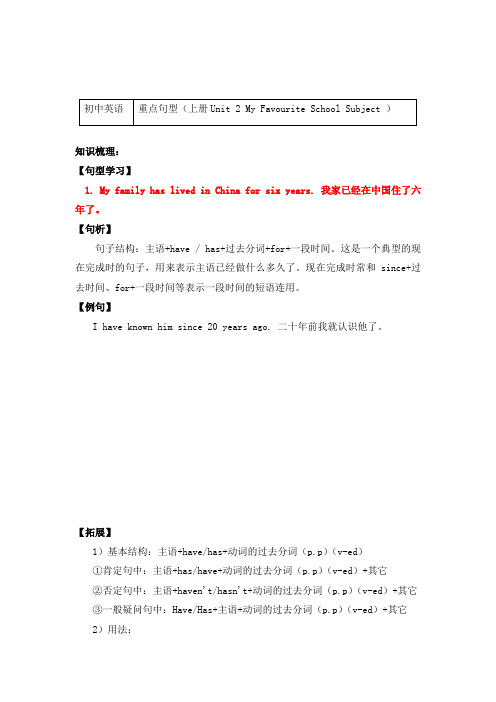
知识梳理:【句型学习】1. My family has lived in China for six years. 我家已经在中国住了六年了。
【句析】句子结构:主语+have / has+过去分词+for+一段时间。
这是一个典型的现在完成时的句子,用来表示主语已经做什么多久了。
现在完成时常和since+过去时间、for+一段时间等表示一段时间的短语连用。
【例句】I have known him since 20 years ago. 二十年前我就认识他了。
【拓展】1)基本结构:主语+have/has+动词的过去分词(p.p)(v-ed)①肯定句中:主语+has/have+动词的过去分词(p.p)(v-ed)+其它②否定句中:主语+haven't/hasn't+动词的过去分词(p.p)(v-ed)+其它③一般疑问句中:Have/Has+主语+动词的过去分词(p.p)(v-ed)+其它2)用法:①表示影响:表示一个过去发生的动作在过去已经完成,并且这个过去发生并完成的动作对现在有影响或结果,同时说话者强调的或感兴趣的就是这个影响或结果。
如:He has left the city. 他已离开这个城市。
(结果:他不在这个城市。
)②表示持续:表示一个过去发生的动作或开始的状态在过去并未完成或结束,而是一直持续到现在,并且有可能继续下去。
如:He has taught in our school for 30 years. 他在我们学校教书已有30年了。
3)标志词:just(刚刚),already(已经),never(从来没有),ever(曾经),before(以前),yet(仍然),once(一次),twice(两次),many times (很多次),how many times(多少次),so far(迄今为止),during the past (last)three years(最近三年来)等。
人教版英语八年级上Unit 10知识点总结(无答案)
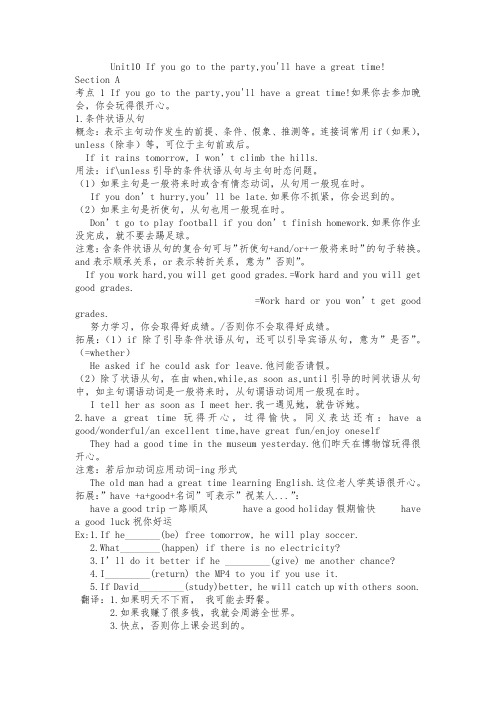
Unit10 If you go to the party,you'll have a great time! Section A考点 1 If you go to the party,you'll have a great time!如果你去参加晚会,你会玩得很开心。
1.条件状语从句概念:表示主句动作发生的前提、条件、假象、推测等。
连接词常用if(如果),unless(除非)等,可位于主句前或后。
If it rains tomorrow, I won’t climb the hills.用法:if\unless引导的条件状语从句与主句时态问题。
(1)如果主句是一般将来时或含有情态动词,从句用一般现在时。
If you don’t hurry,you’ll be late.如果你不抓紧,你会迟到的。
(2)如果主句是祈使句,从句也用一般现在时。
Don’t go to play football if you don’t finish homework.如果你作业没完成,就不要去踢足球。
注意:含条件状语从句的复合句可与”祈使句+and/or+一般将来时”的句子转换。
and表示顺承关系,or表示转折关系,意为”否则”。
If you work hard,you will get good grades.=Work hard and you will get good grades.=Work hard or you won’t get good grades.努力学习,你会取得好成绩。
/否则你不会取得好成绩。
拓展:(1)if除了引导条件状语从句,还可以引导宾语从句,意为”是否”。
(=whether)He asked if he could ask for leave.他问能否请假。
(2)除了状语从句,在由when,while,as soon as,until引导的时间状语从句中,如主句谓语动词是一般将来时,从句谓语动词用一般现在时。
人教新目标八年级英语上册 Unit 10 单词讲解思维导图

8.advice /əd'vaɪs/ n.劝告,建议
记:suggestion n.建议(可数);advice n.建议(不可使)advise v.建议 用:Can you give me some advice? 你能给我一些建议吗?
9.travel /'trævl/ n. & v.旅行
用:I will be happy if I can travel around the world. 如果我可以环游世界,我会很快乐的。
用:He thinks the first step is to find someone you trust to talk to. 他认为找一个你信得过的人谈谈是第一步。
26.solve /sɑːlv/ v.解决;解答
用:It’s best not to run away from our problems. We should always try to solve them. 最好不要逃避问题
15.unless /ən'les/ conj. 除非,如果不
记:拼读-->un+less=if not ;遵循主将从现
30.halfway /ˌhæf'weɪ/ adj.中途的 adv.半路地
用:So you’re halfway to solving a problem just by talking to someone about it. 所以只要和某人谈谈这个问题,你就已经离解决问题不远了。
用:Students often forget that their parents have more experience and are always there to help them. 学生们常常
人教版英语八年级下册 Unit 10 课文解读(含单词、短语等)
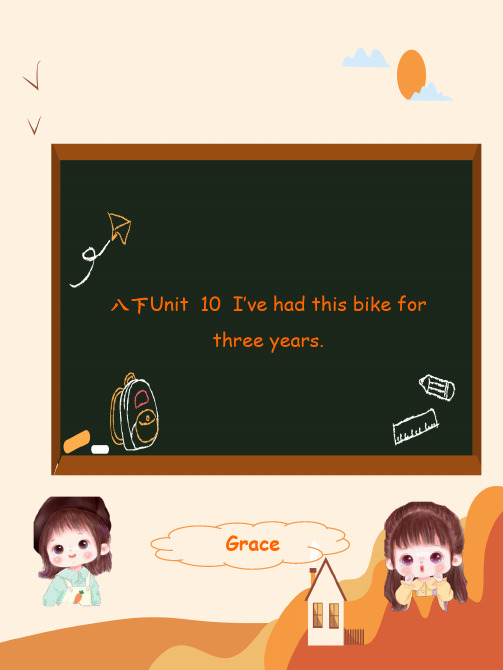
琳达:欢迎来到阳光儿童之家。我是琳达。
埃米:嗨,我是埃米。我有一些东西要送给孩子们。这本杂志我买几个月 了。里面的故事可能有点儿旧了,但是它们仍然很有趣。
琳达:太好了!这里很多孩子喜欢阅读。
埃米:看看这些小孩子玩的毛绒玩具和棋类游戏吧。我还是一个孩子的时 候就拥有它们了。这里还有一件毛衣和一条连衣裙。
八下Unit 10 I’ve had this bike for three years.
Grace
八下Unit 10 Section A (2d)
Linda: Welcome to the Sunshine Home for Children. I'm Linda. Amy: Hi, I'm Amy. I have some things for the kids. I've had this magazine for a couple of months. The stories inside may be a bit old, but they're still interesting. Linda: Great! Many children here love reading. Amy: And check out these soft toys and board games for younger kSidesc.tIio'vneAha(d2dt)h中em英s文ince I was a child. There's also a sweater and a dress. Linda: Perfect! We always need toys and clothes. Amy: One last thing is a bread maker. My mom's had it for a long time but it still works. Linda: Thanks so much!
上海八年级英语下学期期末考点复习精讲精练10 重点语法知识梳理四:代词及专练100题(原卷版)
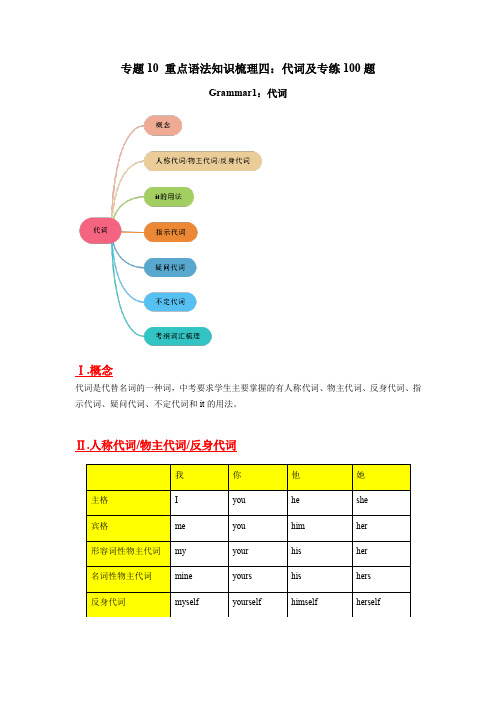
专题10 重点语法知识梳理四:代词及专练100题Grammar1:代词Ⅰ.概念代词是代替名词的一种词,中考要求学生主要掌握的有人称代词、物主代词、反身代词、指示代词、疑问代词、不定代词和it的用法。
Ⅱ.人称代词/物主代词/反身代词注意:(1)主格与宾格:人称代词主格作主语,宾格作宾语,例如:Mr. Wang teaches us English.(2)人称代词的顺序:口诀:单数二三一,复数一二三,受到批评我在前,承认错误你在后。
单数:you+he/she+I复数:we+you+they 例如:You, he and I are all the winners.We, you and they are three groups.I, Li lei and you are wrong. We should do more for the project.(3)名词性物主代词可以用在of 后做定语,相当于“of+名词所有格”表示带有部分概念或有一定的感情色彩。
He is a friend of mine. 他是我的一位朋友。
(4)名词性物主代词相当于“形容词性物主代词+名词”,在句子中起名词的作用,可单独使用。
例Ours(Our city) is an international city.I forgot to take my umbrella. May I share yours(=your umbrella)?- Whose pen is this?- It’s hers.(5)反身代词还和一些动词或介词构成固定搭配。
(6)物主代词用于固定搭配的词组Ⅲ.it的用法1.代替前面提到的事物。
-Where is the book?-The one with V-neck.The old houses have been pulled down, and lots of new ones will be built.2.作主语,表示时间、距离、天气等。
八年级英语上册知识讲义-重点单词(Module 10 The weather)附练习及答案-外研版

初中英语重点单词(Module 10 The weather)知识梳理cloud n. 云minus a. 负的,零下的shower n. 阵雨degree n. 度snow n. & v . 雪;下雪although conj. 尽管storm n. 暴风雨wet a. 湿的cloudy a. 多云的neither adv. 也不rainy a. 多(下)雨的terrible a. 可怕的snowy a. 多(下)雪的wish v. 希望sunny a. 晴朗的probably adv. 或许windy a. 多(刮)风的come on 快点skate v. 滑冰mile n. 英里thick a. 厚的round adv. 围绕地ice n. 冰northwest n. & a. 西北(的)joke n. & v. (说)笑话southeast n. & a. 东南(的)might aux. & v. 可能from time to time 有时temperature n. 温度二、重点单词【单词学习】1. park ☆☆☆【用法】n. 公园【例句】We are going to the park to skate.我们要去公园滑冰。
【拓展】park的含义除了“公园”外,还可以解释成“停车”。
You can’t park your car here.park, drive, neutral, reverse还有就是可以翻译成韩国姓氏“朴”,如韩国总统朴槿惠的名字是:Park Geun-hye【考题链接】请判断下列park的含义:1. Can I park my car here?2. Is there a parking lot?3. I will park my car outside the park.答案:1. 停车 2. 停车场 3. 前者为停车,后者是公园思路分析:根据句子含义和结构来判断。
八年级英语上册 Unit10 I’m going to be a basketball player.说课课件 人教新目标版

4.————————————————
板书设计
: I’m going to be a basketball Unit10
player. A: what are you going to be when you grow up? B: I'm going to be a/an...... A: How are you going to do that? B:I'm going to ......
Step1 Revision Revise the words about jobs by playing a guessing game. Step2 Presentation 1.Teach new words and expressions by showing the pictures. 2.Present What are you going to be when you grow up? How are you going to do that? Step3 Listening Listen and match the items in 1b,then listen and repeat. Step4 pairwork Ask the students to make an investigation about their future plans .
反馈练习 拓展提升
Homewok
Macheng is a beautiful modern city. What are you going to do to make it more beautiful? Please make a list use “be going to”... ... 1.We are going to plant more trees. 2. ————————————————— 3.——————————————————
Unit 10 Section B 讲义 2020-2021学年人教版初中英语八年级下册
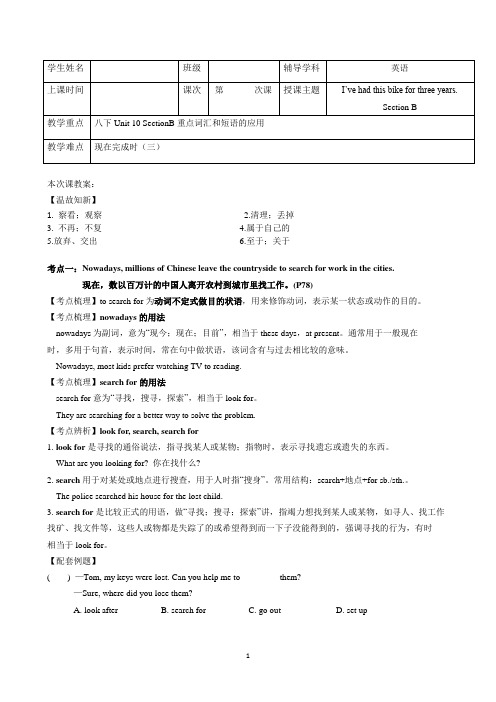
本次课教案:【温故知新】1. 察看;观察_______________2.清理;丢掉_______________3. 不再;不复_______________4.属于自己的_______________5.放弃、交出_______________6.至于;关于_______________考点一:Nowadays, millions of Chinese leave the countryside to search for work in the cities.现在,数以百万计的中国人离开农村到城市里找工作。
(P78)【考点梳理】to search for为动词不定式做目的状语,用来修饰动词,表示某一状态或动作的目的。
【考点梳理】nowadays的用法nowadays为副词,意为“现今;现在;目前”,相当于these days,at present。
通常用于一般现在时,多用于句首,表示时间,常在句中做状语,该词含有与过去相比较的意味。
Nowadays, most kids prefer watching TV to reading.【考点梳理】search for的用法search for意为“寻找,搜寻,探索”,相当于look for。
They are searching for a better way to solve the problem.【考点辨析】look for, search, search for1. look for是寻找的通俗说法,指寻找某人或某物;指物时,表示寻找遗忘或遗失的东西。
What are you looking for? 你在找什么?2. search用于对某处或地点进行搜查,用于人时指“搜身”。
常用结构:search+地点+for sb./sth.。
The police searched his house for the lost child.3. search for是比较正式的用语,做“寻找;搜寻;探索”讲,指竭力想找到某人或某物,如寻人、找工作找矿、找文件等,这些人或物都是失踪了的或希望得到而一下子没能得到的,强调寻找的行为,有时相当于look for。
人教版英语八年级上同步讲义
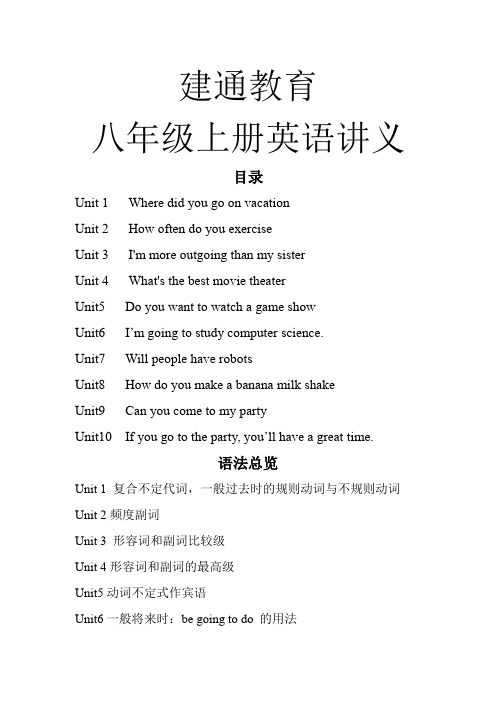
建通教育八年级上册英语讲义目录Unit 1 Where did you go on vacationUnit 2 How often do you exerciseUnit 3 I'm more outgoing than my sisterUnit 4 What's the best movie theaterUnit5 Do you want to watch a game showUnit6 I’m going to study computer science.Unit7 Will people have robotsUnit8 How do you make a banana milk shakeUnit9 Can you come to my partyUnit10 If you go to the party, you’ll have a great time.语法总览Unit 1 复合不定代词,一般过去时的规则动词与不规则动词Unit 2频度副词Unit 3 形容词和副词比较级Unit 4形容词和副词的最高级Unit5动词不定式作宾语Unit6一般将来时:be going to do 的用法Unit7 一般将来时:will do 的用法Unit8可数名词与不可数名词,祈使句Unit9 can表示邀请的用法及其回答Unit10 if引导的条件状语从句;should 的用法Unit1 where did you go on vacation 一、重点词汇anyone ['eniw?n] pron.任何人wonderful ['w?nd?fl] adj.精彩的;极好的few [fju?] adj.很少的;n.少量something ['s?mθ??] pron.某事物;nothing(=not…anything) ['n?θ??] pron.没有什么n.没有myself [ma?'self] pron.我自己everyone ['evriw?n] pron.每人;人人yourself [j??'self] pron.你自己;你亲自bored [b??d] adj.无聊的;厌烦的;郁闷的seem [si?m] vi.似乎;好像decide [d?'sa?d] v.决定;选定try [tra?] v.尝试;设法;努力wonder ['w?nd?(r)] v.惊奇;想知道;怀疑difference ['d?fr?ns] n.差异;不同wait [we?t] v.等;等待(wait for)umbrella [?m'brel?] n.伞;雨伞wet [wet] adj.湿的;雨天的enough [?'n?f] adj.足够的adv.足够地;充分地hungry(反full) ['h??ɡri] adj.饥饿的;渴望的dislike [d?s'la?k] v.不喜欢;厌恶n.不喜爱;厌恶;反感二、短语总汇1、go on vacation去度假,2、stay at home 呆在家,3、go to the mountains 上山/进山,4、go to the beach到海边去,5、visit museums 参观博物馆,6、go to summer camp 去夏令营,7、quite a few 相当多,8、study for为……学习,9、go out 出去,10、most of the time 大部分时间/绝大多数时间,11、taste good 尝起来味道好,12、have a good time玩的开心,13、of course当然可以,14、feel like感觉像……/想要,15、go shopping购物,16、in the past 在过去,17、walk around绕……走,18、too many 太多(可数名词前面),19、because of 因为,20、one bowl of 一碗……,21、find out 查出来/发现,22、go on继续,23、take photos 照相,24、something important重要的事情,25、up and down上上下下,26、come up出来三、语法聚焦A.复合不定代词或副词构成及用法构成:由some, any, no, every分别加上-body, -thing, -one构成的不定代词叫做合成不定代词;加上-where构成副词。
- 1、下载文档前请自行甄别文档内容的完整性,平台不提供额外的编辑、内容补充、找答案等附加服务。
- 2、"仅部分预览"的文档,不可在线预览部分如存在完整性等问题,可反馈申请退款(可完整预览的文档不适用该条件!)。
- 3、如文档侵犯您的权益,请联系客服反馈,我们会尽快为您处理(人工客服工作时间:9:00-18:30)。
2014年秋季八年级英语讲义(十)8A Unit 5教学目标:重点单词词组1. _________________________________________ 最喜爱的野生动物 ________________________________3. _________________________________________ 照顾你自己_______________________________________5. _________________________________________ 更多地了解野生动物_______________________________7.看上去高兴__________________________________9. _________________________________________ 照顾你自己11•野生动物____________________________________知识点归纳1. They may be a delicious meal at any mome nt..delicious美味的,可口的美味的食物may表示推测,译为“可能,也许”,直接加动词原形,用于肯定和否定句中;若表示请求和允许,意为可以;还可以表示祝愿。
他今天没来,可能生病了。
___________________________________________________ 王老师,我可以问你一个问题吗?at any mome nt. 在任何时候2. have pity on 怜悯,同情。
在战场上,不能同情敌人。
____________________________________________补充:What a pity! /It is a pity that…..真遗憾!遗憾的是他不会游泳。
______________________________________________3.I first saw the baby panda我第一次看到这只小熊猫。
first作副词,译为“第一次,首次”,位于助动词、情态动词后,实义动词前。
你第一次见到玛丽是什么时候? ______________________________________________________补充:at first 最初,当初相当于at the beg inning4. We called her Xi Wang 我们叫她希望。
call sb….叫某人……,称呼某人……他们都叫那小男孩老虎。
____________________________________________________________ call还可以表示打电话。
今天早上我给她打了电话。
___________________________________________________5. At four month old, she weighed about ten kilograms and she started to go outside her home for the first time.在四个月大的时候,同事的体重大约是10公斤,并第一次到户外活动。
a. at four month old =whe n she was four mon ths old 当她四个月大的时候b. start to do =begi n to do 开始做某事c. for the first time 第一次6. Eight mon ths later, she was not a small baby any more.个月之后,她不再是一个小幼崽。
一段时间+later,表示一段时间以后。
两年后,他就念完初中了。
________________________________________________________ not…any more 表示“不再”,同义词组为“ no more” .以后,他再也不会相信她所说的话了。
7. at the beg inning 在开始之际at the beg inning of在…开始的时候。
刚上课,她就哭了。
______________________________________________________________补充:at the end of… 在…结束的时候in the end最后8. Sadly, it is very difficult for giant pandas to survive in the wild.遗憾的是,大熊猫很难在野外存活下来。
It is +形容词+(for/of) sb + to do sth表示对某人来说做某事是…2.与…谈话_______________________ 4.脱离危险_______________________ 6.处于危险中_____________________ 8.死于____________________________ 10.看上去美味_____________________ 12和他们交谈_____________________如果形容词表示某人的特征,用介词of,否则用for osurvive表示幸存,也表示从…中逃生。
幸运的是,他从那场大火中存活了下来。
9. Otherwise, there will be soo n no pan das left in the world.否则,很快世界上就没有熊猫了。
otherwise副词,表示“否则,要不然”。
快点啊,要不然我们就迟到了。
there may be 也许有这个岛上也许有一些危险的动物。
___________________________________________________ none left没有一只剩下来。
地震过后,无一人生还。
_____________________________________________________________重点:.动词不定式定义:动词不定式是一种非限定动词形式,通常由to +动词原形构成,有时不带to。
用法:1. 动词不定式作宾语,下列动词可以直接带to:agree ,choose, decide, fail , hope, learn, plan, want 等。
他决定明天去爬山 ________________________________________________________________2. 动词不定式作主语,通常是在句首用形式主语it,而把真正作主语的不定式放在句后,这样可以避免句子头重脚轻的现象。
在形容词easy , hard ‘difficult ‘possible ,n ecessary ,great 等后面都用这种结构,不定式前用for sb。
例:解出这道题对我来说很难。
____________________________________________________ 他很有必要多做练习。
__________________________________________________ 3. 动词不定式作定语。
这些不定式与被修饰动词之间是动宾关系。
例:有许多可吃的食物。
___________________________________________________ 单元巩固练习一.选择填空。
( )1. Do you believe that some people are still liv ing ______ ?A. in wildB. on wildC. in the wildD. on the wild ( )2. I'm sure he will grow _______ a han dsome young fellow whe n he grows _____ .A. in to; upB. up; upC. in to; intoD. up; into ( )3. There are _____ books in the library.A. too manyB. too muchC. much tooD. many too ( )4. He has _____ frie nds here. He ofte n visits them on weeke nds.A. a fewB. a littleC. fewD. Little( )5. It ' s important us _____ a strong body .A. for ; to haveB. to; to haveC. of ; haveD. for; have( )6. Though I love junk food, I try ________ i t two or three times a mon th.A. to eatB. eatC. eati ngD. ate ( )10. ----My mother is ill.--- ___________ .A Don' t worryB I m sorry to hear thatC No hurryD It doesn ' t matter二.用括号内所给词的正确形式填空:1. He looks _____ (sadly) today.2. Whe n she was born, she ______ (weight) three kilos.3. The gia nt pan das like eat ing bamboo _____ (shoot) and ______ (leaf) very much.4. We love the panda _____ (call) Xi Wang.5. We should _______ (en courage) Jim ______ (brave).6. Now many pan das are in ________ (da ngerous).7. If it rai ns tomorrow, we _____ (stay) at home.8. They asked the hun ters _________ (not kill) the tigers.9.1 want to __________ (节约,储存)some money for my son10. _________________________________________ There are many an imals in the zoo, such as __________________________________________ 熊() _______ 袋鼠)and ________ 老虎). 三.句型转换1. The boy lost his way in the supermarket/ 同义句)The boy _______________ in the supermarket.2. We finished the homework without any help.(同义句)We fini shed the homework ____________________ .3. I can 'leave my sister alone. She is too young 写出同义句)I can 'leave my sister ___________________ .She is too young.4. We not protect them, there not be any bears soon用if 改写)5. Xi Wang weighed about 10 kilograms at four mon ths.对划线部分提问)___________________ Xi wang _______ a t four mon ths?6. A male wolf always protects its baby.改成复数形式)Some male ______ a lways ___________________四.翻译(20分)1、这食物看上去美味。
